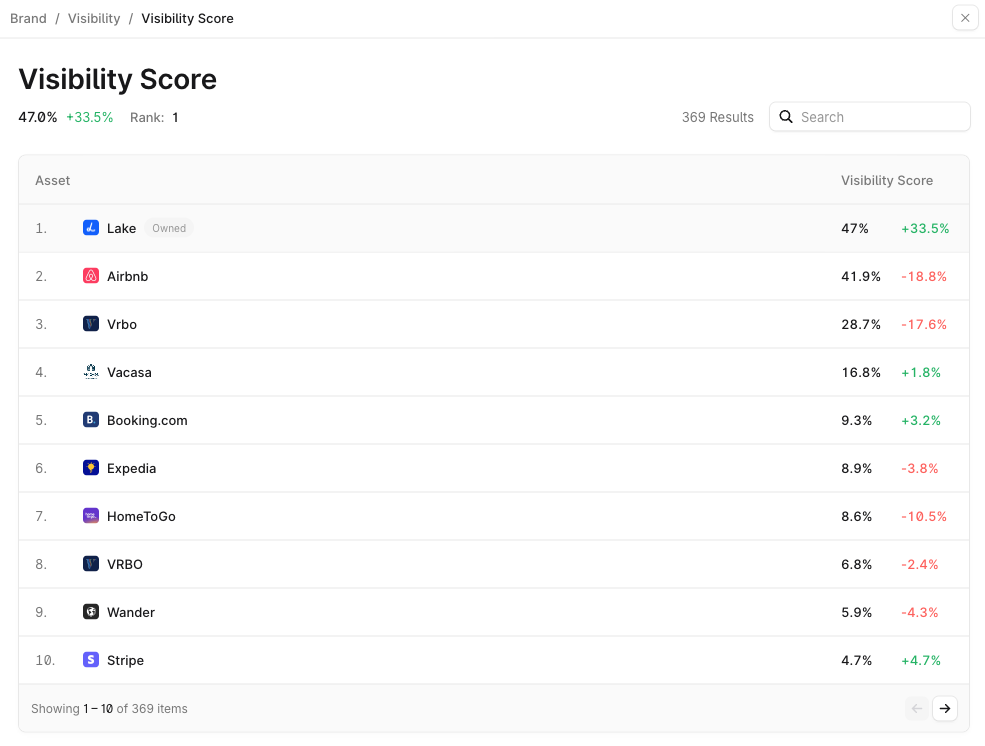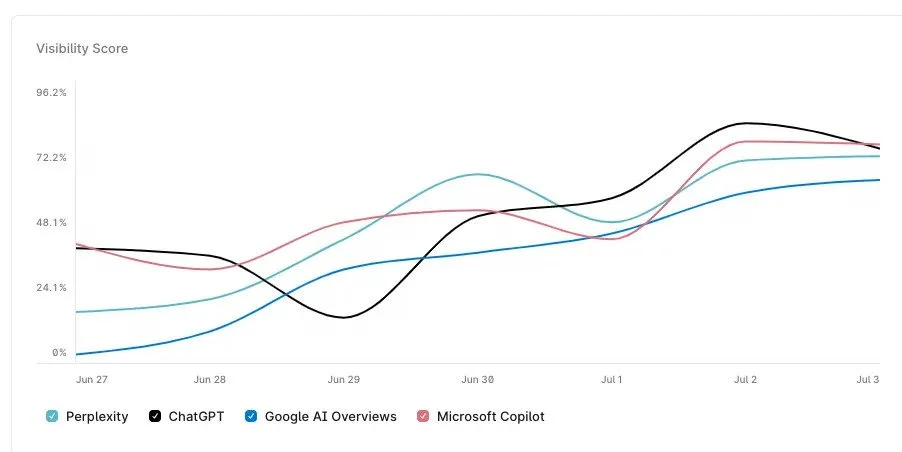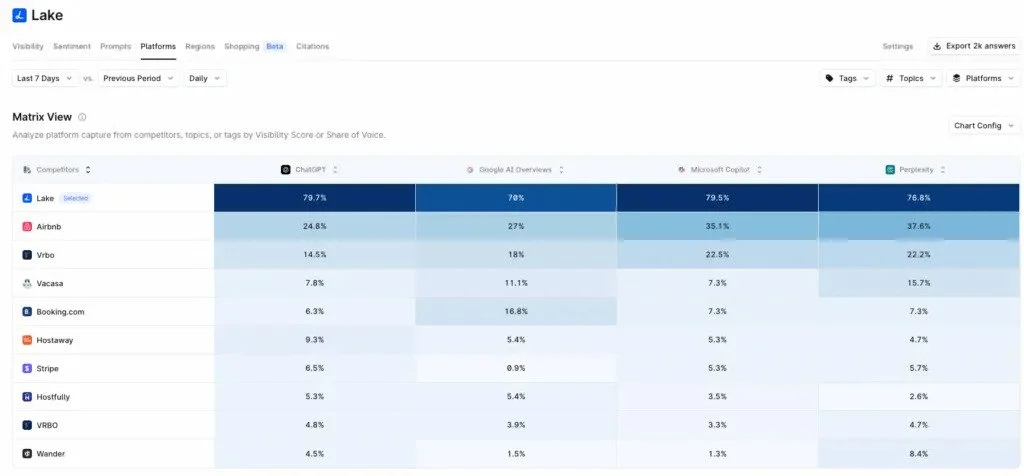WORKING WITH US / THE PROOF IS IN THE PUDDING
Lake Rockets to #1 in AI Visibility for Vacation Rentals, Overtaking Airbnb
In just 21 days, Lake surged 15× in AI answer citations, dethroning Airbnb and Vrbo. Learn how our semantic-search strategy made LLMs choose Lake over billion-dollar competitors. 🚀
Ok, I’ll admit it. I love a good underdog story. Maybe it was all the Rocky movies I watched growing up (I–IV, obviously).
So when Lake told us they were going toe‑to‑toe with travel’s heavyweights, we all knew a traditional approach wouldn’t cut it. Lake wanted to place a smart, strategic bet on AI search—all it took was a little help from us to crack the code.
Well, we didn’t just crack it—we pulverized it. We catapulted Lake’s citation share from a modest 8.6% to an astounding 35% in AI‑generated travel recommendations, while former champions Airbnb and Vrbo watched helplessly as their golden belts got taken away.
And here’s the kicker: we didn’t burn cash on ads or pray for social virality.
Instead, we deployed a surgical, semantic‑driven strategy that compelled AI models to favor Lake over billion‑dollar competitors in destination searches, pricing comparisons, integration guides, and booking tutorials.
Here’s the exact playbook we used to help Lake become the most‑cited travel brand in AI search.
“Growth Marshal didn’t just move the needle — they turned it into a dial and cranked it to eleven. In three weeks we outranked the giants of our industry inside AI search.”
— David Ciccarelli, CEO, Lake
The Challenge
Lake.com is a vacation‑rental platform built around the authentic experience of being by the water. By early 2025, their reliance on Google for discovery faced an emerging threat: travelers had started turning to ChatGPT, Perplexity, and Anthropic’s Claude for travel advice—and Lake.com was nowhere to be found.
Lake’s CEO, David Ciccarelli, knew that ranking in classic search result pages wouldn’t be enough—not anymore. Lake needed to be inside the AI answers themselves.
The Strategy
Airbnb and Vrbo weren’t going to get toppled overnight. But, Growth Marshal was determined that Lake.com would dominate the conversation at every stage.
Capturing Curiosity in the Research Stage
Travel planning begins with curiosity—the so‑called “I Want to Know” moment. At this stage, travelers aren’t booking—they’re exploring ideas.
We positioned Lake.com not as a booking platform, but a trusted editorial guide. We engineered semantically dense, entity‑rich content to address questions like: Where should I go? What makes a place unique? When’s the ideal time to visit?
We developed immersive guides like “Best Lakes for Canoeing: An Adventurer’s Guide,” spotlighting paddling destinations from Lake Tahoe to Lake Louise. Behind every page, we embedded LLM‑optimized structured data. The content may have looked like lists—but it was semantically rich and deeply chunkable, purpose-built for AI retrieval.
For seasonal resonance, we built the “Best National Parks for Stargazing” guide, mapping dark‑sky zones with scientific authority and travel allure. We also published emotionally oriented content like “Most Family‑Friendly US National Parks,” featuring expert contributions. Each asset featured embedded FAQs and schema markup for maximum LLM discoverability.
Serving the Savvy Comparison Shopper
Once inspiration turns to intent—welcome to the “I Want to Go” phase.
Travelers at this point compare amenities, pricing, cancellation policies, and review quality. To meet that demand, we created entity‑heavy, semantically dense destination guides such as “Hot Springs Vacation Rentals,” complete with preset filters (e.g., family‑friendly, pet‑friendly, luxury) to optimize semantic signal retrieval.
Each guide went far beyond surface descriptions—embedded FAQs covered everything from swimming conditions to seasonal wildlife. The structured data behind each page ensured AI models prioritized Lake content during comparative searches.
We also rolled out utility‑first how‑to content, including “Understanding the Booking Process,” which explained search filters, visual listings, guest feedback nuance, and pricing/policy optimization. These highly structured, semantically rich pages reduced friction and built confidence to book.
In the “Guest Center,” we published articles about Lake.com’s product differentiators—like interactive maps, secure payments, advanced filters—each powered by LLM‑optimized structured data. The content was also chunkable for retrieval by AI systems answering deep queries.
Deepening the Experience After Booking
The journey continues past the booking—that’s when “I Want to Do” begins.
We published local experience guides with semantically dense structure, like “Events in Gatlinburg—Festivals, Food and Fun” and comparison pieces like “Anakeesta vs Ober Mountain.” These served as both itinerary planners and destination primers across lake regions like Tahoe, Ozarks, and the Finger Lakes, each backed by structured data to support AI retrieval.
We also produced hyper‑niche local coverage—such as the “Muskoka Antique Boat Show” or “Bass Pro Shops Bassmaster Classic”—providing logistical detail ideal for AI recommendation engines. Every article was chunkable and LLM‑optimized structured content, helping position Lake.com as a definitive travel resource.
The Results
The results were outstanding. Lake.com achieved:
A 33.5‑percentage‑point jump in AI visibility—to 47%, surpassing Airbnb’s 41.9% and Vrbo’s 28.7%.
In just 21 days, Lake’s U.S. AI answer‑citation share expanded 15x, growing from 0.9% to 13.5%.
For unbranded lake‑house queries, Lake.com now appears in 50% of AI‑generated answers, outranking competitors like Vrbo and Expedia.
Google Search Console for Lake.com showing 5x increase in traffic
TryProfound Visibility Score Ranks Lake.com #1
TryProfound Visibility Scores for Lake.com Increase Week-Over-Week
TryProfound Shows Lake.com Taking Top Spot in Answer Engine Visibility
Testimonial
“Kurt rewired the way AI sees us. We’re living at the top of ChatGPT’s answers, our content gets name‑checked by Claude, and customers arrive on our site already trusting us. It’s the most leverage we’ve ever had from a marketing engagement — and it happened in three weeks.”
— Stephanie Ciccarelli, CMO, Lake
What Works to Increase Visibility in AI Search
We didn’t win by chance—it was the result of a precise, engineered approach grounded in these four pillars of AI Search Optimization:
Knowledge graph and trust signals
Knowing what to write—crafting an intent-driven content roadmap aligned to real user prompts
Knowing how to write—leveraging entity proximity, semantic density, and prompt surface optimization
LLM-optimized structured data
We implemented schema markup and FAQ JSON‑LD, and deployed an llms.txt endpoint to invite ChatGPT, Claude, Perplexity, and other models to crawl Lake’s priority pages. We rewrote 28 key pages to include missing entities and high-value terms. Within three weeks, AI bots were hitting Lake.com over 7,000 times per week—turning Lake into an AI citation machine.
READY TO 10x ORGANIC GROWTH?
Stop Guessing and Start Optimizing for AI-Native Search
Or → Start Turning Prompts into Pipeline!











